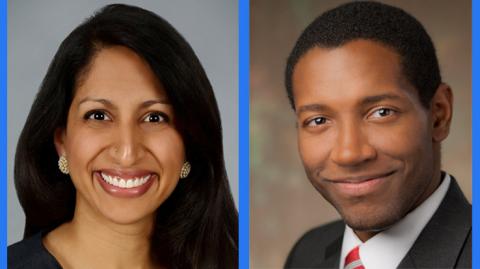UCSF Urology Assistant Professor Sima Porten, MD, MPH was  Drs Sima Porten and Sam Washington
selected as one of the final seven proposals to receive OptumLabs-funded access to its database of de-identified, linked clinical and administrative claims information (the OptumLabs Data Warehouse). OptumLabs collaborated with dozens of partners such as AARP and The American Cancer Society to create a rich, highly curated data set of over 200 million de-identified lives containing linked data from administrative claims, medical records and self-reported health information. This offers real-world insights on individuals' complete health experience.
Drs Sima Porten and Sam Washington
selected as one of the final seven proposals to receive OptumLabs-funded access to its database of de-identified, linked clinical and administrative claims information (the OptumLabs Data Warehouse). OptumLabs collaborated with dozens of partners such as AARP and The American Cancer Society to create a rich, highly curated data set of over 200 million de-identified lives containing linked data from administrative claims, medical records and self-reported health information. This offers real-world insights on individuals' complete health experience.
Dr. Porten will examine the impact of socioeconomic status on healthcare utilization & expenditures in individuals with bladder cancer treated with radical cystectomy. This study will provide additional insight into the relationship between individual wealth, healthcare expenditures, and outcomes after surgery.
In a joint interview with Dr. Porten and urologic oncology fellow, Samuel Washington, MD, MAS we sought to better understand the wealth of information that could be garnered from these data sets, their hopes for insights, and why it matters.
UCSF Urology: What makes this data set special?
+From our collaboration with OptumLabs we have access to a unique combination of data from multiple sources in healthcare, linking electronic medical records data, administrative claims data, lab tests results, and consumer data. By linking these datasets together, our study can provide a more comprehensive and granular perspective on this issue than prior studies.
UCSF Urology: Your grant looks at bladder cancer recovery. Give us a big picture overview what factors contribute to recovery.
+Recovery after major surgeries like cystectomy is complex. Most studies start at time of surgery, but much of the recovery may be influenced by preoperative, non-clinical factors such as the patient's access to healthcare resources. Using knowledge from the Colorectal Surgery literature, we have adopted an Enhanced Recovery after Surgery (ERAS) protocol to reduce postoperative opiate use, promote early return of bowel function, and shorten hospital stays. But in the postoperative period, supportive care from providers can help patients thrive and avoid emergency department visits and hospital readmissions. Efforts to provide intravenous hydration to avoid dehydration, frequent check-ins within the first 2 weeks after hospital discharge to identify potential complications early, and in-home services, if needed, to aid recovery at home can promote recovery after surgery. But unfortunately, patients without access to these resources are reliant upon emergency department visits and hospital readmissions to obtain much needed care.
UCSF Urology: What are you trying to discover?
+The overarching goal of implementing such protocols is to not only improve recovery but also reduce healthcare-related costs for patients and the healthcare system. In this study we aim to examine what non-clinical demographic factors such as a person's wealth are associated with increased utilization of these resources, whether these protocols are reducing the risk of emergency department visits and hospital readmissions, and whether these protocols are reducing healthcare costs or increasing them.
UCSF Urology: Why does this matter?
This study is both timely and important because it provides a much more detailed and comprehensive look at the relationship between clinical practice and healthcare spending at a time when there are valid and significant concerns surrounding the provision and costs associated with healthcare in this country.
UCSF Urology: No one data set can tell a researcher everything they want to know…If you had a magic wand, what question do you wish the data set could prove?
Hmmm..that is a great question!
After major surgeries such as radical cystectomy, we aim to anticipate potential issues or complications early rather than later. We hope to provide a safety net for patients so they know that they are being taken care of rather than having to deal with these issues alone. Additionally, we hope that if complications arise they understand that we are there to help them through the situation. Without that support in place, the morbidity related to complications and the mental health impact of having to deal with medical issues alone can be significant. In a perfect world, we hope to prove that these anticipatory effects and support provide not only medical support but also promote wellness after a life-changing event such as major surgery.

